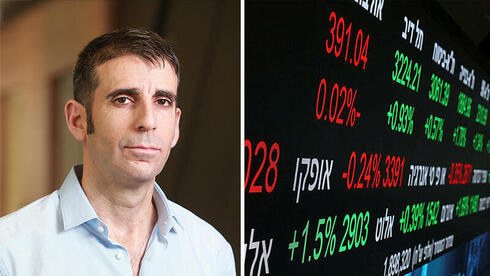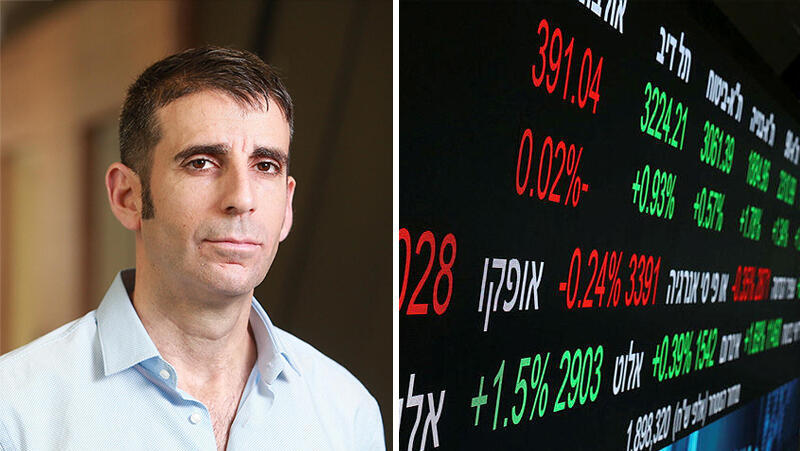
"Increase your exposure to Israel. Long-term, that’s the right move"
The CEO of Phoenix Investment House Avner Hadad believes that there are good reasons for the rise in the Tel Aviv Stock Exchange this week despite the war with Iran.
The Tel Aviv Stock Exchange climbed by around 7% this week despite the outbreak of direct hostilities with Iran, the toll on the Israeli home front and the billions of shekels required to finance each day of war.
To a large extent, investors appear to be pricing in “the day after” - anticipating an optimistic scenario in which the Iranian existential threat is significantly reduced or removed from over Israel’s head. While some senior market figures are raising eyebrows at this optimism, arguing that many investors are ignoring substantial risks that may yet materialize, others see strong logic behind the market's behavior.
Among them is Avner Hadad, CEO of Phoenix Investment House and co-CEO of Kesem Funds, which together manage approximately 131 billion shekels. Hadad argues that this optimism is not naive, but rather grounded in rational, well-supported expectations.
In an interview with Calcalist, Hadad explained: “Several dynamics are at play here. If you look at Israel’s history, a year after each war the market typically rises, sometimes by tens of percent. That’s not accidental. War, terrible as it is, often leads to a clearer geopolitical picture or even new agreements. The market hates uncertainty, and war - ironically - can reduce it. That’s what we’re seeing now: a forward-looking market pricing in the likely decline in geopolitical risk.”
Hadad adds that the psychological and market processes that typically unfold over months are now happening at warp speed.
“After October 7, the market initially plunged and then recovered. Investors now ask themselves: Why wait? If the patterns are familiar, we can fast-forward through them. On the first trading day after the Iran front opened, the market dipped 2% at the open but ended slightly up. The next day, it rose more substantially.”
He continues: “We’re seeing a contraction of the usual timeline. History gives us tools. Assuming it's still relevant, the market now has a reference point. There was significant stress at the start of the war with Iran, but now, because the war seems to be going well from Israel’s perspective, investors feel a major threat is being lifted, and they like that.”
According to Hadad, this perception of reduced risk is strengthening the shekel and drawing investors to local assets. “Israel is being viewed as a regional power. It has resilient companies and a world-class high-tech sector. Investors are envisioning a post-conflict reality where the risk premium drops. It's like holding a BB-rated bond that might be upgraded to AA while keeping the high yield. That’s very attractive.”
Yet there’s a sense that markets are not pricing in any pessimistic scenario, not even a drawn-out campaign that, while possibly successful, would still result in daily images of destruction, mounting casualties, soaring costs, and a ballooning budget deficit.
“Every complication, every extension of this war, is less positive,” Hadad concedes. “But investors are asking themselves a long-term strategic question: Will Israel be safer at the end of this? If the answer is yes, they are willing to tolerate the pain.”
He also notes a shift in investor sentiment: “A year ago, money was flowing out of Israel. That may have been a mistake. Investors are now reassessing. They understand the deficit will rise and that we’ll need to finance it. But they’re focused on the strategic inflection point - removing an existential threat. That’s good for citizens, companies, and the economy.”
When asked why the bond market isn't reacting more negatively to the expected surge in government debt, Hadad replies: “There’s always a price. But investing is about alternatives. Investors compare the cost of solving the problem with the cost of living with it. The latter is ultimately higher. They believe in the strength of Israel’s companies and their ability to help the economy rebound.”
“Yes, the day after the war will still bring structural challenges. Budgets aren’t growth-friendly, and segments of the population remain excluded from the workforce. But investors know this already. That’s the baseline - call it ‘X.’ What’s being priced in now is the removal of the Iranian threat. It doesn’t mean ‘X’ becomes ‘Y’ overnight. It just means the biggest cloud may be lifting.”
Hadad acknowledges that negative surprises are always possible: “Of course things can go wrong. But markets are based on probability and visibility. Right now, bonds and stocks are rising because the dominant scenario is positive. Even if there’s some profit-taking after a 7% rally in two days, that’s normal. The bigger question is whether increasing exposure to Israel makes sense, and the answer is: absolutely.”
As for contingency planning, Hadad says his investment house is constantly reassessing: “Our analysts monitor everything. If a new factor emerges, we’ll adjust. The war in Gaza, for example, dragged on longer than expected and disrupted some of our assumptions. But the broader trend was strong enough to absorb that. The Israeli market has not only closed its performance gap with global peers, it’s now outperforming many.”
He also sees rising interest from diverse investors: “Institutional, foreign, and retail money is flowing in. On Sunday, when foreign traders weren’t active, turnover still reached over 2 billion shekels, double the average for that day. Retail investors alone accounted for 35% of April’s trading volume. That’s a stabilizing force.”
What’s your main advice to investors?
“Increase your exposure to Israel. Long-term, that’s the right move, especially if the existential threat is reduced. I don’t understand people who live here, serve in the IDF, raise their families here, but have most of their portfolios in the U.S. You’re betting against yourself. That doesn’t make sense.”
On concerns about low liquidity, Hadad pushes back: “Liquidity is improving. The local market is vibrant. Even institutional investors can build or unwind positions gradually. Ultimately, markets are a long game, like chess. The goal is not to find the winner every other day. It’s to build the right portfolio, stay disciplined, and stay invested.”














